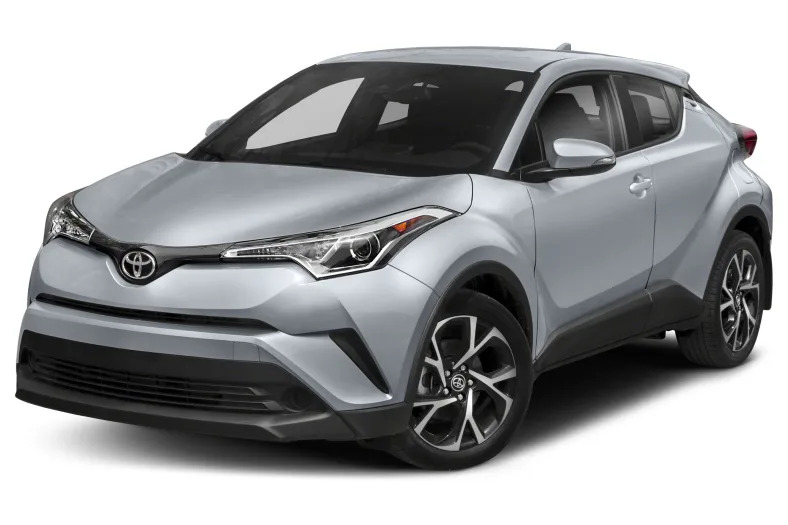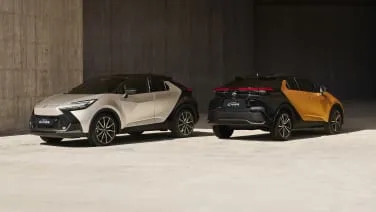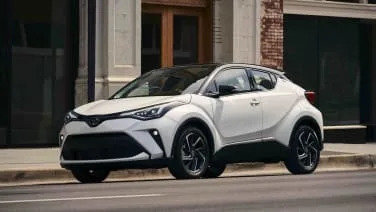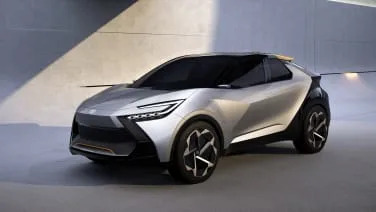Limited 4dr Front-Wheel Drive Sport Utility
2019 Toyota C-HR
The Toyota C-HR was a new vehicle last year, and a bit of a mystery. 'C-HR'? is said to stand for 'Coupe, High Riding,'? which is a head-scratcher. Whatever it is, it's a jazzy-looking hatchback that's one of the more intriguing vehicles Toyota builds. The C-HR shares its platform with other small Toyotas including the Prius and Corolla, on a compact-sized wheelbase of 103.9 inches. But the C-HR is meant for the young crowd, who might think those vehicles are for a later stage in life.
For 2019, the C-HR adds two models and takes away one. In 2018 its introduction year, there was an XLE and XLE Premium; now Toyota sells a base LE, XLE, and Limited. The C-HR LE costs $1,300 less than last year's XLE, and gets a bigger touchscreen with Apple CarPlay compatibility.
The front-wheel-drive C-HR is powered by a 2.0-liter 4-cylinder engine that makes 144 horsepower and 139 pound-feet of torque, coupled to a continuously variable transmission (CVT). The C-HR weighs 3,300 pounds with no passengers, so accelerate is moderate. The EPA rates the 2019 C-HR at 27 mpg city, 31 highway, 29 combined.
The Toyota C-HR gets five stars overall in crash safety from the NHTSA, with four stars for frontal impact and rollover prevention. The IIHS gave the C-HR top 'Good'? scores on all its tests, including the new passenger-side small-overlap crash test. The IIHS also rated the small Toyota's automatic emergency braking system as 'Superior'? in preventing forward crashes, but called its headlights “Poor,” even with automatic high beams.
Impressively for a low-priced compact, standard equipment includes automatic emergency braking, forward-collision warnings, active lane control, automatic high beams, and adaptive cruise control, as well as 10 airbags, a lot for a compact car. Blind-spot monitors are optional. .
Full Review
Full Review
The C-HR shares its platform with other small Toyotas including the Prius and Corolla, on a compact-sized wheelbase of 103.9 inches. But the C-HR is meant for the young crowd, who might think those vehicles are for a later stage in life.
For 2019, the C-HR adds two models and takes away one. In 2018 its introduction year, there was an XLE and XLE Premium; now Toyota sells a base LE, XLE, and Limited. The C-HR LE costs $1,300 less than last year's XLE, and gets a bigger touchscreen with Apple CarPlay compatibility.
The front-wheel-drive C-HR is powered by a 2.0-liter 4-cylinder engine that makes 144 horsepower and 139 pound-feet of torque, coupled to a continuously variable transmission (CVT). The C-HR weighs 3,300 pounds with no passengers, so accelerate is moderate. The EPA rates the 2019 C-HR at 27 mpg city, 31 highway, 29 combined.
The Toyota C-HR gets five stars overall in crash safety from the NHTSA, with four stars for frontal impact and rollover prevention. The IIHS gave the C-HR top 'Good'? scores on all its tests, including the new passenger-side small-overlap crash test. The IIHS also rated the small Toyota's automatic emergency braking system as 'Superior'? in preventing forward crashes, but called its headlights “Poor,” even with automatic high beams.
Impressively for a low-priced compact, standard equipment includes automatic emergency braking, forward-collision warnings, active lane control, automatic high beams, and adaptive cruise control, as well as 10 airbags, a lot for a compact car. Blind-spot monitors are optional. .
Hide Full Review
Retail Price
| Engine | 2.0L I-4 |
| MPG | 27 City / 31 Hwy |
| Seating | 5 Passengers |
| Transmission | CVTi-S 2-spd CVT w/OD |
| Power | 144 @ 6100 rpm |
| Drivetrain | front-wheel |





